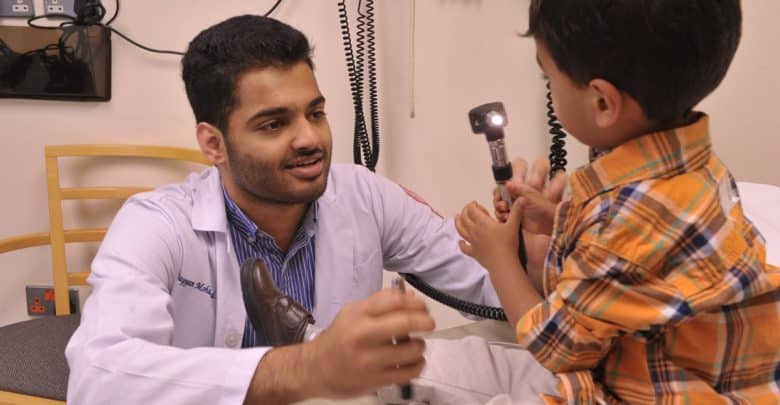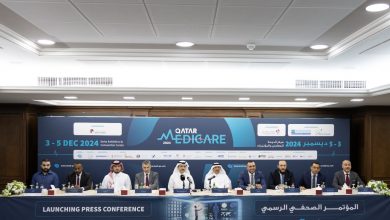
Children attend Cornell Stars event
نجوم كورنيل يساهمون في تنمية مهارات الطلاب
DOHA: Medical students at Weill Cornell Medicine-Qatar had the chance to hone their skills by performing basic clinical examinations for children at the college’s annual Cornell Stars event.
Faculty and staff brought their children to WCM-Q’s Clinical Skills and Simulation Lab so that students could learn how to interact with children and family members and develop the creative skills that paediatricians use to approach children. They also experimented with different techniques to keep the youngsters relaxed, engaged and contented for long enough to conduct a physical examination.
The event forms an important part of the students’ introduction to WCM-Q’s clinical clerkships and courses. The students, who are all heading into the third year of the medical curriculum, were tasked with performing a basic physical examination of children of various ages, under the supervision of WCM-Q faculty and doctors from Hamad General, Al Wakra and Sidra hospitals.
The examination involves checking the child’s reflexes, examining their ears and eyes, listening to their heartbeat and breathing using a stethoscope, and assessing whether normal developmental milestones have been reached.
Dr Amal Khidir, associate professor of paediatrics, and organiser of the Cornell Stars program, said, “Cornell Stars is a wonderful opportunity for the students to gain some practical experience of working with young children, learning how to approach them and their families, engage them, keep them at ease, using distraction techniques where needed, so that a basic but comprehensive physical exam can be carried out.
“We are very grateful to our young volunteers and their parents for being so patient and generous with their time for the benefit of our students.”
Dr Khidir explained that with adults, examinations usually proceed systematically from head to toe, but with children it is an opportunistic but complete examination. The physicians must be prepared to adapt the order, often while the examination is in progress. Usually a doctor will start at the heart and lungs of a young child and go on to the abdomen, before examining the ears and finally the nose and throat so as to minimize distress.
They need to be flexible to examine the child in mom’s lap if needed. They also need to use their senses and refine their observation skills to be able to gather the information needed to take care of or treat the child.
This year, 27 children aged four months to six years took part in Cornell Stars, along with 40 third-year students.
Student Huda Alalami said: “I found it a really helpful exercise. I had never examined a child before and I was a little bit concerned that it would be very tricky and the child might get upset. But the supervisors showed us some really useful techniques that helped to keep the children calm.”
شارك 40 طالباً وطالبة من وايل كورنيل للطب – قطر في فعالية “نجوم كورنيل” السنوية التي تنظمها الكلية في إطار المساق التدريبي الإكلينيكي التمهيدي الذي يستهدف طلاب السنة الثالثة من برنامج الطب. وقد أجرى الطلاب خلالها فحوصات إكلينيكية أساسية لحوالي 27 طفلاً تتراوح أعمارهم بين أربعة أشهر وست سنوات، شملت التحقق من استجابات الأطفال وتقييم مراحل نموهم وفحوصات للأذنين والعينين والتنفس ونبضات القلب باستخدام سمّاعة الطبيب.
وخلال الفعالية التي عقدت في مختبر المهارات الإكلينيكية والمحاكاة، اصطحب أعضاء الهيئتين التدريسية والإدارية أطفالهم ليتعلّم طلاب الطب أفضل أساليب فحص الأطفال دون أن يشعروهم بالقلق أو التوتر، وليكتسبوا مجموعة من المهارات الإبداعية التي يستخدمها أطباء الأطفال أثناء تعاملهم مع الصغار.
أشرف على الطلاب أعضاء هيئة التدريس في وايل كورنيل للطب – قطر وأطباء من مستشفى حمد العام ومستشفى الوكرة والسدرة، وهم: الدكتور مهدي عدلي، الدكتور محمد عمر، الدكتورة باربارا بلاكي، الدكتور وائل علي سليم، الدكتورة شابينا خان، الدكتورة سمر عثمان، الدكتورة سهير الصدّيق، الدكتور مناسك كامل تاركوني حسن، الدكتور روبرت كرون، والدكتورة أمل خضر.
وقد نوّهت الدكتورة أمل خضر، أستاذ طب الأطفال المشارك في وايل كورنيل للطب – قطر ومنظّمة فعالية “نجوم كورنيل”، بأهمية هذه الفعالية ودورها في اكتساب طلاب الطب الكثير من المهارات المهمة من خلال التفاعل عن كثب مع الأطفال. وقالت: “تمثل هذه الفعالية فرصة ممتازة للطلاب لاكتساب خبرة عملية للتعامل مع الصغار، والتعرف على أفضل أساليب التفاعل مع الطفل وأسرته، وكيفية إقناع الطفل بإجراء الفحص اللازم دون إثارة خوفه أو قلقه. نحن ممتنون للغاية للمتطوعين الصغار وأولياء أمورهم الذين كرّسوا وقتهم دعماً لهذه الفعالية”.
وأوضحت الدكتورة خضر أن طبيعة فحص الأطفال تقوم على اقتناص الفرص، فبينما يتّبع الطبيب منهجية تتابعية محدّدة مع البالغين، يتعيّن عليه انتهاز الفرص كلما امتثل الطفل له، وفي العادة يبدأ طبيب الأطفال بفحص قلب الطفل ورئتيه قبل الانتقال إلى بطنه ومن ثم أذنيه، والانتهاء بفحص أنفه وبُلعومه، وهذه الطريقة تقلّل من احتمال مضايقته. وبينّت أنه يجب أن يتمتع الطلاب بدرجة كبيرة من المرونة والقيام بإجراء الفحص الطبي للطفل وهو في حضن أمه إذا تطلب الأمر. كما يحتاج الطلاب أيضاً إلى استخدام حواسهم وتحسين مهاراتهم في الملاحظة ليتمكنوا من جمع المعلومات اللازمة لرعاية الطفل أو علاجه.
وفي السياق نفسه، قالت الطالبة هدى العلمي: “كانت التجربة مفيدة جداً. لم يسبق لي أن قمت بفحص طفل من قبل، وقد كنت أعتقد ان إجراء الفحوصات الطبية للأطفال من الأمور الصعبة والتي من المُمكن أن تتسبب بإزعاجهم. لكننا تعلمنا من الأطباء المشرفين أساليب مفيدة جداً استطعنا من خلالها المحافظة على هدوء الأطفال أثناء إجراء هذه الفحوصات”.



